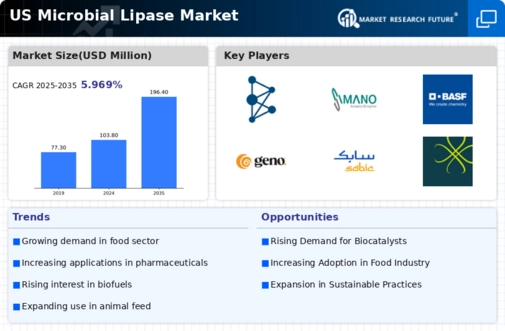Growing Applications in Biocatalysis
The US microbial lipase market is experiencing a notable expansion due to the increasing applications of microbial lipases in biocatalysis. These enzymes are utilized in various sectors, including pharmaceuticals, food processing, and biofuels. The versatility of microbial lipases allows for their use in catalyzing reactions under mild conditions, which is particularly advantageous in green chemistry. As industries seek to enhance efficiency and reduce environmental impact, the demand for biocatalysts is projected to grow. According to recent estimates, the biocatalysis market in the US is expected to reach USD 5 billion by 2027, indicating a robust growth trajectory that will likely benefit the microbial lipase sector. This trend suggests that the US microbial lipase market will continue to thrive as more companies adopt biocatalytic processes.
Rising Demand for Biodiesel Production
The US microbial lipase market is poised for growth due to the increasing demand for biodiesel production. Microbial lipases play a crucial role in the transesterification process, which converts fats and oils into biodiesel. As the US government continues to promote renewable energy sources and reduce reliance on fossil fuels, the biodiesel market is expected to expand significantly. Recent data indicates that the US biodiesel production capacity is projected to reach 3 billion gallons by 2025. This growth in biodiesel production is likely to drive the demand for microbial lipases, as manufacturers seek efficient and sustainable methods for biodiesel synthesis. Consequently, the US microbial lipase market stands to benefit from this trend as it aligns with broader energy policies.
Increased Focus on Health and Nutrition
The US microbial lipase market is significantly influenced by the rising consumer awareness regarding health and nutrition. As individuals become more health-conscious, there is a growing demand for functional foods that incorporate beneficial ingredients, including microbial lipases. These enzymes are known to enhance the digestibility of fats and oils, making them appealing for use in dietary supplements and health foods. The market for functional foods in the US is projected to surpass USD 275 billion by 2026, which could lead to increased utilization of microbial lipases in food formulations. This trend indicates that the US microbial lipase market is likely to see a surge in demand as manufacturers seek to cater to the evolving preferences of health-oriented consumers.
Regulatory Support for Enzyme Production
The US microbial lipase market benefits from favorable regulatory frameworks that support enzyme production and usage. Agencies such as the Food and Drug Administration (FDA) and the Environmental Protection Agency (EPA) have established guidelines that facilitate the safe use of microbial enzymes in food and industrial applications. This regulatory support not only ensures consumer safety but also encourages innovation within the enzyme sector. As a result, companies are more inclined to invest in research and development for microbial lipases, leading to enhanced product offerings. The US enzyme market is projected to grow at a compound annual growth rate (CAGR) of 6.5% through 2025, suggesting that the regulatory environment is conducive to the growth of the microbial lipase market.
Technological Innovations in Enzyme Production
The US microbial lipase market is being propelled by technological innovations that enhance enzyme production processes. Advances in fermentation technology, genetic engineering, and enzyme formulation are leading to more efficient and cost-effective production methods. These innovations not only improve the yield of microbial lipases but also expand their applicability across various industries, including food, pharmaceuticals, and biofuels. For instance, the development of recombinant microbial lipases has opened new avenues for customization and optimization, catering to specific industrial needs. As the enzyme production landscape evolves, the US microbial lipase market is likely to experience increased competitiveness and growth, driven by these technological advancements.
















